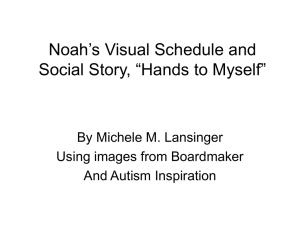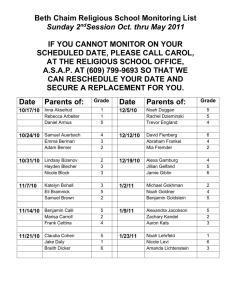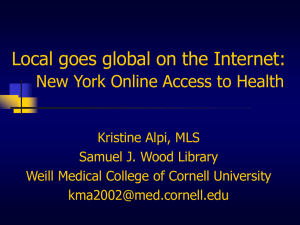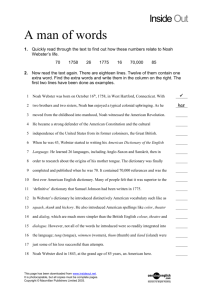Literary Analysis
advertisement
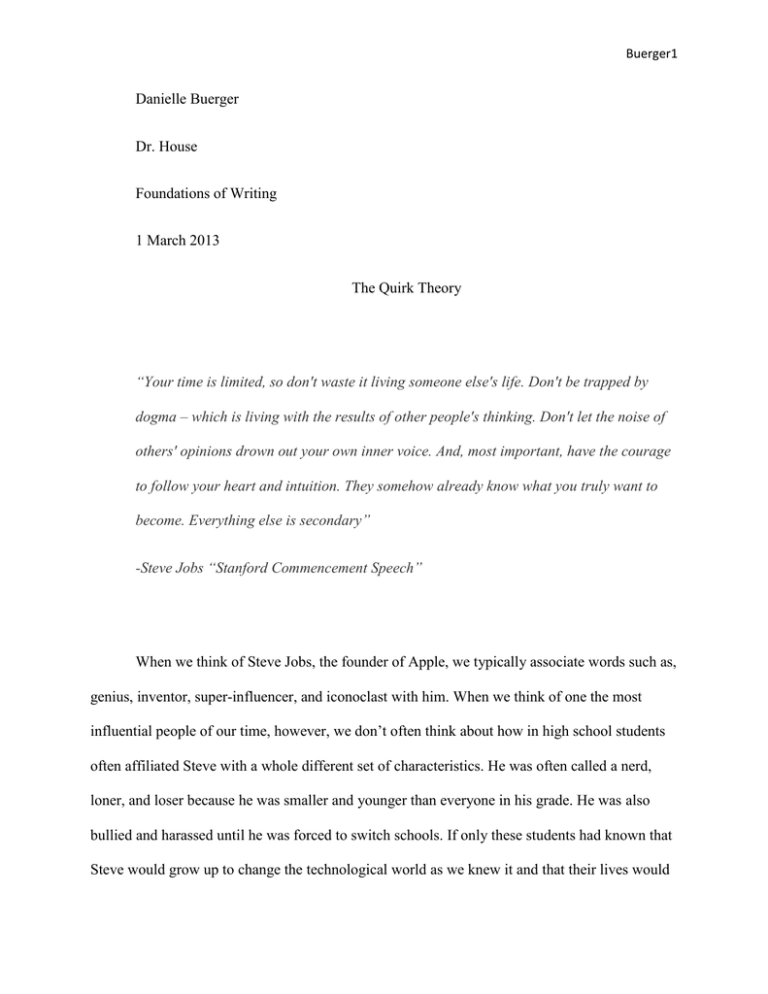
Buerger1 Danielle Buerger Dr. House Foundations of Writing 1 March 2013 The Quirk Theory “Your time is limited, so don't waste it living someone else's life. Don't be trapped by dogma – which is living with the results of other people's thinking. Don't let the noise of others' opinions drown out your own inner voice. And, most important, have the courage to follow your heart and intuition. They somehow already know what you truly want to become. Everything else is secondary” -Steve Jobs “Stanford Commencement Speech” When we think of Steve Jobs, the founder of Apple, we typically associate words such as, genius, inventor, super-influencer, and iconoclast with him. When we think of one the most influential people of our time, however, we don’t often think about how in high school students often affiliated Steve with a whole different set of characteristics. He was often called a nerd, loner, and loser because he was smaller and younger than everyone in his grade. He was also bullied and harassed until he was forced to switch schools. If only these students had known that Steve would grow up to change the technological world as we knew it and that their lives would Buerger2 run off Steve’s inventions. Many of the students in The Geeks Shall Inherit the Earth share Steve’s unique intelligence. Throughout the novel, Blue, Eli, and Noah all struggle in their own way to fit in with their classmates and utilize their unique characteristics for the good of the school. In The Geeks Shall Inherit the Earth, Alexandra Robbins proves that the unique characteristics people are persecuted for in high school are the gifts that are appreciated in the real world for inciting progress and calling forth world change. Blue, a creative freethinker who encapsulates himself in gaming, has trouble forming connections with people and meeting friends that value his particular way of thinking. Blue felt isolated from his friends because they did not care to appreciate his interests in non-mainstream activities such as: gaming, rebuilding cars, drawing, and technology. With his friends and his mother discouraging his pursuits, Blue struggled to realize that there were people out there who find his interests intriguing. When the school changed his gaming club to a superficial club that did not represent the real meaning of gaming, Blue felt like everyone was attempting to hinder his talents. Blue failed to realize that “we wouldn’t have progress without the foresight of people who devise or are willing to operate under different philosophies and points of view” (Robbins 161). Blue had a very different way of thinking than most kids his age and he was extremely intelligent outside of the classroom; he sent his free time doing computer programming and rebuilding cars. His hobbies weren’t popular among his classmates, but they showed that he had a different type of intelligence in him that could one day be very significant and change the world. When Blue joined the AP Government class, however, he met a group of friends who were fascinated with his unique interests. They found the beach adventure he took them on exciting and even appreciated his highly organized room. His new friends made him feel valued and respected for all the things his old friends deemed unimportant. Soon he joined the Buerger3 Simulated Congressional Hearings where he would have his chance to use his insights as a useful attribution to his high school experience. Blue helped the team significantly improve their ranking by going out of his way to hold meetings, study additional material, and buy books for team members to read that would enhance their knowledge. Blue soon turned optimistic about his future with all the appreciation and encouragement he got from his team mates and new friends. When the University of Hawaii expressed interest in Blue for his exceptional test scores and rare point of view, he was put in the running for a scholarship. Although he did not get the scholarship, it was important that Blue got recognized for being global and “look[ing] at things differently than other people” and for “always looking at both sides, the big picture, and draw[ing] [his] own conclusions” (238). Throughout the narrative, Blue went from being an intellectual loner who longed for appreciation to a well-connected individual who shared his diverse talents socially, intellectually, and globally while maintaining his ideals and staying true to himself. Noah, a caring and responsible individual, was misunderstood by his peers. He was constantly made fun of by his teammates for his long hair, which he was growing to donate to someone who had lost their hair due to cancer. Despite the harassment, Noah continued to grow his hair out and put his best effort into the swim team. While it would have been “easier to conform to the crowd, being different [is what] made [Noah] extraordinary” (168). Noah refused to cut his hair to fit in with the rest of the swim team when it would have been easier to do so because he liked his hair and believed in putting other people before himself. Noah’s dedication and selflessness were positive attributes that his classmates were too blind to recognize. Additionally, Noah’s devotion to the presidential election although all the odds were against him and his commitment to the band were two other aspects that would be appreciated in the real Buerger4 world. This kind of dedication would be useful in the real world because it is hard to find people who are truly dedicated to their work like Noah was; his dedication would be a unique aspect that could help him succeed in the workplace when he is older. At school, however, Noah still struggled to fit in. “The need to belong is one of the most powerful human motivations,” however, the challenge comes when figuring out how to belong without compromising yourself (231). Noah set up a recycling program at school, which helped him find a way to belong while still representing his ideals. Before Noah knew it, people were reaching out to him to join the program and students around the school were enthusiastic about recycling. When “a popular kid whom [Noah] had notions about was willing to help,” Noah’s spirits lifted significantly (265). The recycling program helped Noah find a way to belong because he earned respect from people who used to bully him and he was stimulating real change in the school both socially and environmentally. Not only did Noah’s recycling program save tons of paper, but it also united students from different social circles. Additionally, Noah was inciting more progress by getting students to sign a petition to induce a Mandarin Chinese language program in the school. Noah was getting appreciated in a positive light for his dedication and caring attitude; these were all the same characteristics he was made fun of for before. Once Noah learned how to express his ideals to his classmates in a way they would acknowledge, he saw positive changes in his grades, in his self-confidence, and in his overall happiness. The principal also recognized Noah’s accomplishments and adopted him into the senior advisory council. These major accomplishments made Noah realize that you can be accepted while still representing who you are and your beliefs, you just have to find the right light to express yourself in. Eli, an intelligent student who had his future planned, dealt with teasing and the fact he didn’t fit in. Unlike the other characters, however, he had a light in all the darkness to look Buerger5 forward to, his future at West Coast University. Eli had trouble getting people to talk to him in school, let alone hangout with him after school and be his friend. Eli, however, refused to give up faith in himself because he knew his future was brighter than his classmates futures. He knew that “if [he] spent [his] school years repressing [his] identity, someday [he would] graduate and realize that [he] lost [himself] only to appease a temporary crowd” (380). Eli continued to express his passion for knowledge by taking an active role in the Academic Bowl where his insights were appreciated and he continued to embrace the fact that “awkwardness define[d] his life” (34). Despite his friend’s attempts to persuade him to be more socially acceptable, Eli continued to remain true to himself and refused to sacrifice who he was for popularity. He attempted to plan several outings with friends, but his efforts only relayed disappointment. He clung on to the hope that when he went away to college he would find people who understood him. Eli emailed a friend telling him that “there [was] a teeny-tiny art of his soul holding on and thinking the best is yet to come” (271). Sure enough, when Eli went to orientation at West Coast University, he met a girl named Lindsey who enjoyed talking to him and shared similar interests in lifelong learning. He realized that “college [would] be full of Lindsey’s: genuinely nice people [he] could become friends with” (370). Eli finally got the assurance he needed to prove that people in college would value him for the characteristics people in high school ostracized him for. Throughout the novel, Eli remained true to his ideals and took assurance in the belief that he would have a brighter future than his classmates. Eli was bright enough to recognize that what he was isolated for in high school would help him flourish in real life, so he never compromised himself due to pressure to conform. Buerger6 The unique stories each of the characters all helped Alexandra Robbins prove that the unique characteristics people are persecuted for in high school for are the gifts that are appreciated in the real world for inciting progress and calling forth world change. Blue, Noah, and Eli all have unique characteristics about them that are positive attributes in the real world. They all worked hard through their high school years to make students understand them and appreciate them. Also, just like Steve Jobs the characters in this book were smart enough to realize not to “let the noise of others opinions drown out [their] inner voice” (Jobs Stanford Commencement Speech).
